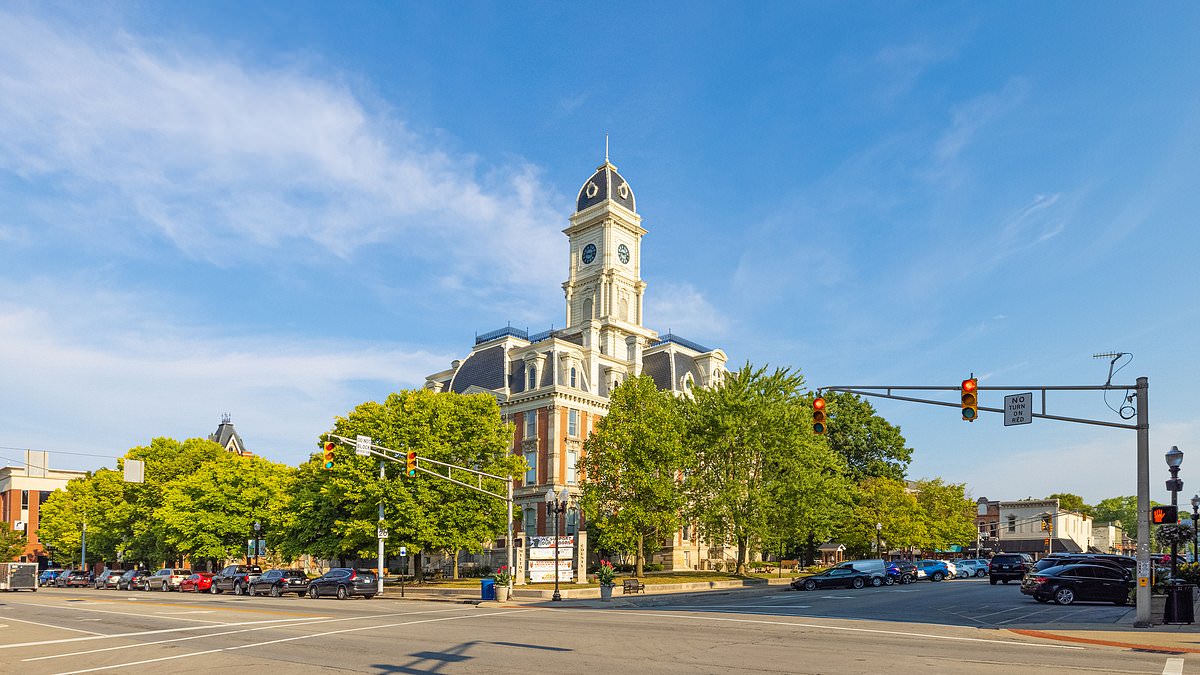Small towns across America are offering remote workers thousands of dollars in cash and other incentives to move in an attempt to reinvigorate their economies.
Among the towns leading the charge is Noblesville, an Indianapolis suburb, which offered Ford data engineer Brandon Speece and his fiancée $5,000 to relocate.
On top of the cash bonus, Speece was given perks like free concert tickets, a membership to a shared working space and access to a golf course.
‘The biggest benefit was the cash, which we just turned around and used to hire movers,’ Speece told The Wall Street Journal, adding that ‘the co-working space was great, and the golfing didn’t hurt.’
The drive from small towns to boost their economies with work-from-home residents comes as many employers have retained out of office working hours since the pandemic.
Those who enjoy such perks have the freedom to live wherever they want, and small cities have taken notice.
Companies like MakeMyMove, a platform for worker-relocation programs, have also been created to take advantage of the demand.
MakeMyMove now has 178 programs covering hundreds of cities and towns across the United States, according to co-founder Evan Hock.
Despite post-pandemic initiatives by many large companies to bring their employees back to the office, 10 percent of the American workforce remains remote. That number has stayed relatively stable since 2023.
Noblesville runs one of the larger programs on MakeMyMove and has successfully relocated 102 remote workers since 2022, bringing it a total of 253 new residents.
The program boasts a 90 percent retention rate and is forecasted to have a $37.6 million economic impact over the next five years, according to the city.
The residents who moved with the program make an average of $80,000 in wages, while the average price of the homes they buy are around $500,000.
‘In Indiana in particular — and probably across the country — you’re either growing or dying as a community,’ Noblesville Mayor Chris Jensen told The Journal.
With those stakes in mind, cities and towns on MakeMyMove are battling to offer the best goodies to the roughly 17 million remote workers.
Terre Haute, Indiana; Columbus, Georgia; and Whitesburg, Kentucky, are also giving out incentives worth $5,000 to $7,000.
Tulsa Remote is also among country’s most established remote-worker programs and says it has gotten over 3,600 people to move to Tulsa, Oklahoma, since 2018.
Seventy percent of the people who moved with Tulsa Remote since 2019 are still living in the city.
The program, funded through the George Kaiser Family Foundation, pays $10,000 to remote workers who stay for at least a year.
According to a study funded by Tulsa Remote and conducted by the W.E. Upjohn Institute for Employment Research, the program has more than paid for itself.
The study found that each dollar spent on Tulsa Remote ended up returning $4 in local benefits, mostly through tax revenue and job creation.
It also found that the program was six times better at creating jobs than traditional business incentives.
Eastern Kentucky has its own remote worker program that hopes to replace much of the devastation that has been left after the coal industry’s long decline.
LaTasha Friend manages the region’s program, EKY Remote, and said she hopes to revitalize a part of the country that has fallen on hard times in recent years.
‘Growing up in Eastern Kentucky, you’re told if you want to be successful you need to leave the region,’ she told The Journal. ‘That kind of hurts my heart.’
Since launching in 2024, EKY Remote has relocated 51 households to Eastern Kentucky, which makes up over 158 people in total.
Kentucky’s capital city, Frankfort, has its own remote-worker initiative that has brought five workers to live there since its launch in 2023.
The package deal includes a $5,000 cash bonus, a bourbon distillery tour and the promise of meeting the mayor.
For families looking to get out of major cities but find it difficult to move because of high interest rates or other factors, remote-worker programs can be a lifeline.
When David Wellington’s Washington, D.C.-area job went remote during the pandemic, he and his wife began looking for the best incentives.
They ended up choosing Noblesville because of its affordable real estate, well-ranked schools and proximity to family members in Indiana.
The Wellingtons sold their three-bedroom townhouse in the D.C. area for $640,000 and paid just $600,000 for their new five-bedroom home in Noblesville. The couple then used the $5,000 from the city government to furnish their new place.
‘I don’t think we had ever imagined living in Indiana at all,’ Wellington said. ‘We’re both coasters.’
